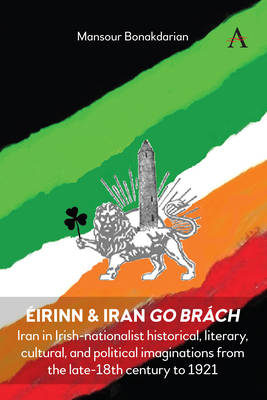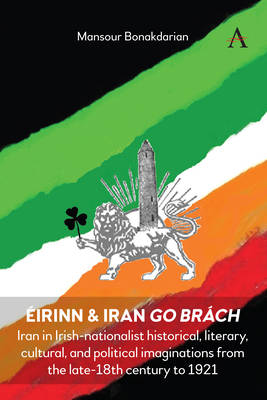
- Retrait gratuit dans votre magasin Club
- 7.000.000 titres dans notre catalogue
- Payer en toute sécurité
- Toujours un magasin près de chez vous
- Retrait gratuit dans votre magasin Club
- 7.000.0000 titres dans notre catalogue
- Payer en toute sécurité
- Toujours un magasin près de chez vous
Éirinn & Iran Go Brách
Iran in Irish-Nationalist Historical, Literary, Cultural, and Political Imaginations from the Late 18th Century to 1921
Mansour Bonakdarian
Livre relié | Anglais
177,45 €
+ 354 points
Description
This book chiefly approaches Irish nationalist references to "Iran" as a conceptual lens for probing a broad array of developments in Irish nationalist formulations of Irish history (from ancient times to post-Norman conquests), as well as formulations of Irish identities and modes of "collective" nationalist recollection. Key thematic examples in the book range from the late eighteenth-century antiquarian debates on Irish origins to the "Iran/Erin" interchange in Irish nationalist poetry of the likes of Thomas Moore and James Clarence Mangan in the first half of the nineteenth century, the coverage of the Anglo-Iranian War of 1856-1857 in the Irish nationalist press, studies on Irish folklore by the likes of Lady Jane Wilde in the second half of the century, the emergent Aryanist discourse in some Irish nationalist circles after the mid-nineteenth century, Irish nationalist responses to the Iranian "Great Famine" of 1870-1872, references to Iran in the context of Irish Literary Revival at the turn of the twentieth century, Irish nationalist advocacy of the Iranian Constitutional Revolution of 1906-1911, and cross-territorial expressions of solidarity during and after the First World War. The only exception to the general timeline covered in the book is the section on James Joyce's Finnegans Wake (1939), which serves as a means of interrogating the post-1922 shrinking world horizon of nationalist historiography and politics in the Irish Free State.
- In its specifically "Iran"-themed approach, this book highlights both the greater centrality of Iran in Irish nationalist antiquarianism after the late eighteenth century and in subsequent Irish nationalist folklore studies than hitherto acknowledged. At the same time, this book goes beyond explorations of Irish nationalist appropriations of "Iran" (past and contemporary) as reflected in a wide spectrum of debates ranging from antiquarian theories of Irish origins to studies on Irish folklore and mythology, as well as the manifold utilizations of Iran in Irish nationalist literature. Additionally, this book examines sporadic Irish nationalist interest in contemporary developments in Iran after the middle of the nineteenth century, most notably in the form of the protracted and multivalent Irish nationalist advocacy of Iranian sovereignty from 1907 to 1921. In the process, this book also highlights the persistently "worlded" framework of Irish-nationalist self- imaginations.
Spécifications
Parties prenantes
- Auteur(s) :
- Editeur:
Contenu
- Nombre de pages :
- 786
- Langue:
- Anglais
Caractéristiques
- EAN:
- 9781839989452
- Date de parution :
- 05-12-23
- Format:
- Livre relié
- Format numérique:
- Genaaid
- Dimensions :
- 152 mm x 229 mm
- Poids :
- 1315 g

Les avis
Nous publions uniquement les avis qui respectent les conditions requises. Consultez nos conditions pour les avis.






